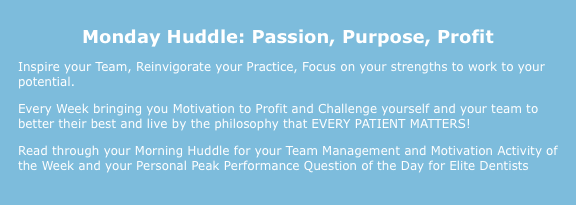Distractions can take your team’s focus away, gets them wasting time on non-essential activities. Before you know it the day runs out, the patient leaves, the conversations were never had, the follow-up is never carried through.
I would say distractions from the core objective are the biggest time wasters and opportunity losers in any given day of clinical operation.
This is also the biggest source of stress and frustration for you and your team members day to day. We are talking about anything that takes away from the core objectives, daily goals, priorities, responsibilities and outcomes.
Simple examples to get you started and then you can take it from here:
If the phone rings and the person isn’t fully focused on that prospective patient (or if the phone doesn’t get answered at all) then you are losing that patient before you ever got him/her; that’s the worst kind of opportunity lost.
If the patient comes in and some how, through time inefficiency or schedule ineffectiveness, you reach a point where you can’t finish the visit in terms of making sure the next phase, step, diagnosis is fully accepted and scheduled – you lose the person before you can solidify the treatment, now you have just cost yourself at least three, four, maybe six months (that’s if they are reliably coming back in).
If there are gaps in communication where unaccounted for tasks distract the team from focusing on the patient (either administratively or clinically) that simply through better clarity of responsibilities could be avoided to prevent time from being wasted and opportunity from being lost.
These are very easy, daily, patient-by-patient examples – there are many more general and specific things that warrant your attention and identification – it begins with a discussion.
That’s your homework for this week… Open up a dialogue to discuss the things that distract and get in the way. Everyone should have ideas and get an opportunity share, as each team member has a different and distinct perspective.
You should have a combative solution for each distraction to minimize, mitigate, or eliminate it. Someone should own the responsibility of ensuring its execution for every single one of the distractions.
Let’s get to work on things that matter, how to make every day, every team member and every patient more successful in your practice.



